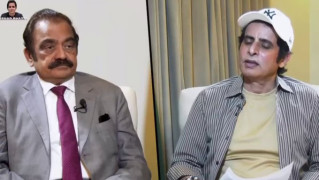Azizan
MPA (400+ posts)
بیرون ملک مقیم پاکستانیوں کومبارکباد, کہ پاکستان کی سپریم کورٹ نے آپ سب کواپنی مرضی کے لوگ نئےالیکشن میں چننے کا حق دے دیا اور آپ وہیں سے ووٹ ڈال پائیں گے ! انشاءاللہ
The Pakistan Tehreek-e-Insaf (PTI) had submitted a petition in the Supreme Court seeking the right to vote for overseas Pakistanis. After a few hearings the Supreme Court bench, headed by the chief justice himself, ruled that Pakistani nationals, including those Pakistanis possessing dual nationality, cannot be denied their right to vote.
Please visit the below link for more information or details. Thanks

The Pakistan Tehreek-e-Insaf (PTI) had submitted a petition in the Supreme Court seeking the right to vote for overseas Pakistanis. After a few hearings the Supreme Court bench, headed by the chief justice himself, ruled that Pakistani nationals, including those Pakistanis possessing dual nationality, cannot be denied their right to vote.
The Supreme Court ruling was explicit in directing the Election Commission of Pakistan (ECP) to work out the modalities to enable overseas Pakistanis to exercise their right to vote.
The ECP has since been exploring options, without much success so far, to enable overseas Pakistanis to vote in the coming general elections.
The ECP needs to devise methodologies to enable the 4.4 million overseas Pakistanis to exercise their right to vote; ensure that overseas voting is completed on election day in Pakistan; and maintain confidentiality of the voting process.
For decades the ECP has been using postal ballot for government officials who, because of exigencies related to their service, cannot be present in the areas where they are registered as voters. Extending this methodology overseas presents challenges specific to individual countries, rendering this option impractical.
Using postal ballot for overseas Pakistanis involves the following: voters knowing their respective returning officers’ contact details; overseas Pakistanis applying to the returning officers for postal ballot; the returning officer deciding the application; the ECP establishing polling stations overseas; and overseas Pakistanis travelling to the polling stations on election day to cast their votes.
This cumbersome process becomes even more impractical where the polling date falls on a working day, which would require people taking time off work and incurring travel expenses. The requirement to complete the process within a defined timeframe makes it even less practical.
The current situation demands alternative options and exploring the use of technology not dissimilar to that used in banking and the mobile phone industry. Imagine if there were a way to establish the true identity of a citizen casting a vote.
Would it really matter how s/he exercised the right? One solution comes to mind: using voice recognition software to authenticate the identity of a person and allowing votes to be cast over the phone.
The most modern and secure transaction I would recommend for overseas Pakistani voters is by recording the voice note of each overseas voter and tagging it to their respective identity document.
The ECP must ask Nadra to arrange for the recording of each voter’s voice note and tagging it to their respective CNIC/Nicop. This can easily be achieved through Nadra’s franchises across major population centres over a period of 60-90 days.
On election day the voter can call a dedicated phone line for the call to be authenticated through the voter’s voice note. The caller would then be offered a constituency-specific integrated voice response menu and offered to cast his/her vote by selecting a name from among the several read out as options.
This entire exercise can be implemented within 90 days at zero cost to the government. The costing specifications I can explain at a later stage.
In the future, voice tagging should be extended to the entire population, so that by the general elections of 2018, every Pakistani can exercise his/her right without needless worry.
To prevent voting by proxy and other malpractices employed during general elections in Pakistan, I would recommend confirming the presence of each voter by matching his/her fingerprints to those on their CNICs; and issuing ballot papers only to those whose thumb prints match their CNIC prints.
Implementation of this type of authentication would require the ECP to arrange one laptop per polling station (100,000 by then), each loaded with the voters’ list, together with the given voter’s biometric record duly matched with the list.
Each laptop should have an extended battery life of 18 hours and should have a barcode reader, a fingerprint reader, and a receipt printer. The ECP should ensure voters swipe their CNIC and provide their thumb prints at the same time.
This record will be matched with the record on the computer (6,000 to 8,000 voters already entered in the laptops at each poling station) in real time; in case of a match, it will translate into a ballot paper being printed. This will be presented to the officer and the authenticated person will be given a ballot paper.
This does not require fresh registration since records already exist. This method – doable and practical – will prevent ballot-stuffing or voting by proxy.
The writer, a former MNA, is a senior vice president of the Pakistan Tehreek-e-Insaf (PTI).
http://www.thenews.com.pk/Todays-News-9-149436-Voters-overseas
The Pakistan Tehreek-e-Insaf (PTI) had submitted a petition in the Supreme Court seeking the right to vote for overseas Pakistanis. After a few hearings the Supreme Court bench, headed by the chief justice himself, ruled that Pakistani nationals, including those Pakistanis possessing dual nationality, cannot be denied their right to vote.
Please visit the below link for more information or details. Thanks

The Pakistan Tehreek-e-Insaf (PTI) had submitted a petition in the Supreme Court seeking the right to vote for overseas Pakistanis. After a few hearings the Supreme Court bench, headed by the chief justice himself, ruled that Pakistani nationals, including those Pakistanis possessing dual nationality, cannot be denied their right to vote.
The Supreme Court ruling was explicit in directing the Election Commission of Pakistan (ECP) to work out the modalities to enable overseas Pakistanis to exercise their right to vote.
The ECP has since been exploring options, without much success so far, to enable overseas Pakistanis to vote in the coming general elections.
The ECP needs to devise methodologies to enable the 4.4 million overseas Pakistanis to exercise their right to vote; ensure that overseas voting is completed on election day in Pakistan; and maintain confidentiality of the voting process.
For decades the ECP has been using postal ballot for government officials who, because of exigencies related to their service, cannot be present in the areas where they are registered as voters. Extending this methodology overseas presents challenges specific to individual countries, rendering this option impractical.
Using postal ballot for overseas Pakistanis involves the following: voters knowing their respective returning officers’ contact details; overseas Pakistanis applying to the returning officers for postal ballot; the returning officer deciding the application; the ECP establishing polling stations overseas; and overseas Pakistanis travelling to the polling stations on election day to cast their votes.
This cumbersome process becomes even more impractical where the polling date falls on a working day, which would require people taking time off work and incurring travel expenses. The requirement to complete the process within a defined timeframe makes it even less practical.
The current situation demands alternative options and exploring the use of technology not dissimilar to that used in banking and the mobile phone industry. Imagine if there were a way to establish the true identity of a citizen casting a vote.
Would it really matter how s/he exercised the right? One solution comes to mind: using voice recognition software to authenticate the identity of a person and allowing votes to be cast over the phone.
The most modern and secure transaction I would recommend for overseas Pakistani voters is by recording the voice note of each overseas voter and tagging it to their respective identity document.
The ECP must ask Nadra to arrange for the recording of each voter’s voice note and tagging it to their respective CNIC/Nicop. This can easily be achieved through Nadra’s franchises across major population centres over a period of 60-90 days.
On election day the voter can call a dedicated phone line for the call to be authenticated through the voter’s voice note. The caller would then be offered a constituency-specific integrated voice response menu and offered to cast his/her vote by selecting a name from among the several read out as options.
This entire exercise can be implemented within 90 days at zero cost to the government. The costing specifications I can explain at a later stage.
In the future, voice tagging should be extended to the entire population, so that by the general elections of 2018, every Pakistani can exercise his/her right without needless worry.
To prevent voting by proxy and other malpractices employed during general elections in Pakistan, I would recommend confirming the presence of each voter by matching his/her fingerprints to those on their CNICs; and issuing ballot papers only to those whose thumb prints match their CNIC prints.
Implementation of this type of authentication would require the ECP to arrange one laptop per polling station (100,000 by then), each loaded with the voters’ list, together with the given voter’s biometric record duly matched with the list.
Each laptop should have an extended battery life of 18 hours and should have a barcode reader, a fingerprint reader, and a receipt printer. The ECP should ensure voters swipe their CNIC and provide their thumb prints at the same time.
This record will be matched with the record on the computer (6,000 to 8,000 voters already entered in the laptops at each poling station) in real time; in case of a match, it will translate into a ballot paper being printed. This will be presented to the officer and the authenticated person will be given a ballot paper.
This does not require fresh registration since records already exist. This method – doable and practical – will prevent ballot-stuffing or voting by proxy.
The writer, a former MNA, is a senior vice president of the Pakistan Tehreek-e-Insaf (PTI).
http://www.thenews.com.pk/Todays-News-9-149436-Voters-overseas
Last edited by a moderator:



































